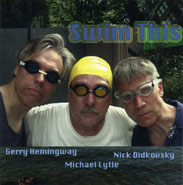Didkovsky/Hemingway/Lytle
Swim This
(Punos Music)
During the forty years of its existence (give or take one year,
of course) - i.e., since the day it started perceiving itself as different
and separate from the kind of improvisation that was an integral part of
(so-called) Free Jazz - improvised music has mutated into many different
streams, and a whole series of approaches, that quite often make it hard
for one to classify everything under one "umbrella name", or
"genre", except by negation: i.e., for what it's not.
Even when taking into consideration all the different backgrounds
that are often brought into light, be it "jazz" or (as it's increasingly
been the case with the passing of time)
"contemporary-classical", I believe that the two turbo engines
largely responsible for the fast changing rate of this music have been the
possibility to record it and the existence of affordable computers: while
the former has made it possible for players to listen (ex post) to the music
"from an outside point of view", the latter has made it possible
to bring into the writing of the software itself those improvising strategies
derived from logic system that are able to originate (if one so wishes) even
chance results (the most widely known example, I think, being George Lewis's Voyager).
Keeping
in mind that the signal/noise ratio of a CD is a lot more favorable to
serene listening than that of the old vinyl, which sometimes was also manufactured
on the cheap, I have to admit that with the passing of time I've tended
to gravitate more and more towards albums where a more "teleological"
approach - in the meaning referred to by Evan Parker (see those albums released
under the name Electro-Acoustic Ensemble) was being adopted; while I've always
tried to attend as many concerts of "improvised music" as I could,
some of them - for instance, one performed last year by Looper & John
Tilbury - being incredibly good.
But
what should one expect from a live CD by Nick Didkovsky, Gerry Hemingway
and Michael Lytle? Didkovsky is obviously known as the composer, guitar
player and first among equals of the US line-up Doctor Nerve, of which
Lytle is the excellent clarinet player; while most people remember Hemingway
for the time he spent playing drums in the fantastic Anthony Braxton quartet
in the 80s, he has a long and varied discography of very high quality.
Swim
This was recorded live on March, 19, 2006. Here we have an impeccable recorded
sound, which makes it possible for us to appreciate some hyper-realistic
moments such as the trebly cymbals that on track 2 follow the guitar part
(at 5'35") which in the course of my listening sessions I started
referring to as "the Pinball Wizard moment" (!).
The
album is split in two parts, of approximately equal length, for a total
duration of about 67'. The second part is quite similar to what I (not
consciously) expected this record to be, with extroverted drums and clarinet
on track 6, the guitar and the trio fireworks on track 7, and a certain
"cool" elegance on the part of the clarinet on track 8. Instead,
the CD turned out to be a source of endless surprises, so that two weeks
after the moment I had broken the shrink wrap I still found new things I
had not noticed before. It goes without saying that the whole is quite layered
(this doesn't mean that the whole is cloudy!). It's that to the expected
drums, clarinets and tabletop guitar we have to add Lytle's pre-recorded
tapes and Didkovsky's homebrew software. And these make all the difference.
In
a quite specific sense, we could define the CD's second part as being the
very elegant "resolution" (where sources are quite often easy
to locate, and the development more easily accessible) of a first part
that's very often inscrutable, though transparent to one's ears, where
quite often no sound we hear is easily attributable to a specific instrument,
while sometimes we hear two clarinets playing at the same time.
There
are a lot of dimensions one could investigate here. One is "density".
Another one is "surprise". Everything has "maturity" as
their antecedent (consider how many options were discarded!). I think it
can be said that Swim This an album that shows a depth of thinking that's
nowadays not at all common. Just a caveat for those who are always in a
hurry: "don't come near".
Beppe Colli
© Beppe Colli 2007
CloudsandClocks.net | Mar. 12, 2007











